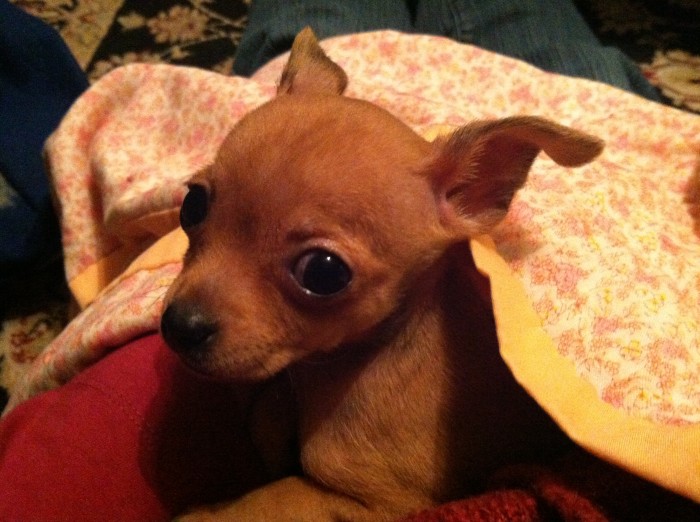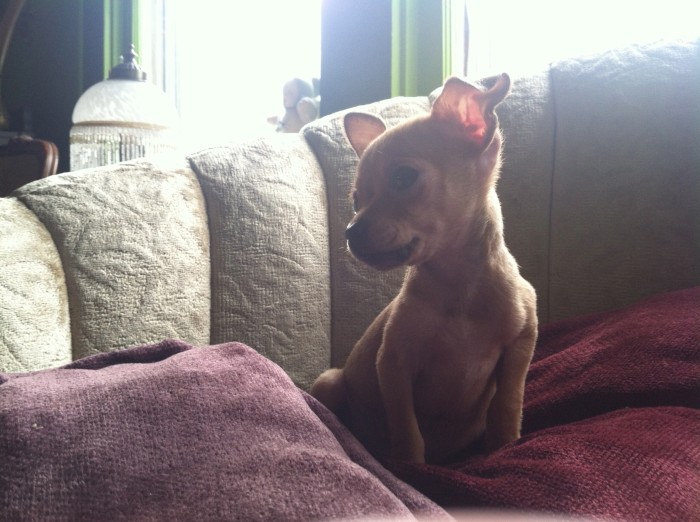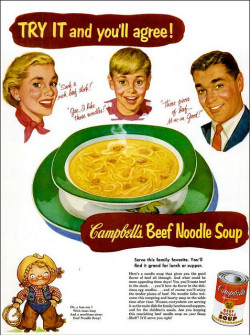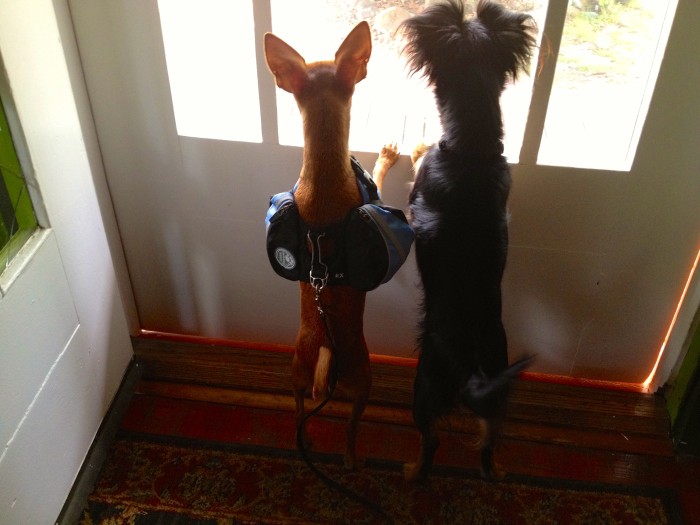(Baby Dingo the rescue dog made us vegan!)
A friend of mine asked me the other day how my vegan diet was going. Veganism is one of my most favorite topics, and so I launched into all the hot spots-delicious…check, healthy…check, ethical…check. I was just about to ask her if she was interested in trying to go vegan when she stopped me with the dreaded sentence: “I could never do it.”
I remember feeling that way. I was surrounded by dairy and meat in television commercials, fast food, and backyard barbecues. I sensed the vague undercurrent of negativity when someone asked for a vegetarian or vegan option. I connected meat and dairy with holidays, family get-togethers, and date nights, rather than with exploitation and abuse. I never saw an animal suffer so that I could eat it. I get why people feel like they could never do it. But they are incorrect, just like I was. They are suffering from a mixture of denial and habit, just like I was. They could do it, they just don’t want to, just like I didn’t.
Occasionally, however, something happens that makes it impossible to continue denying the suffering of animals. Maybe it’s an undercover video that you can’t forget. Maybe it’s a connection with a beloved pet that opens your eyes. Maybe a loved one becomes a vegan. Whatever the reason, once your eyes are opened to your role in animal exploitation, it’s difficult to close them again. Once my eyes were open, I mourned all the time that I’d spent in denial and considered all the ways I could help others to open their eyes too.
(In the United States, eating dogs is considered inhumane…)
Why do so many people continue to deny that what they are doing is resulting in animal suffering? It’s a system that has a name:
Carnism is the invisible belief system, or ideology, that conditions people to eat certain animals. Carnism is essentially the opposite of veganism; “carn” means “flesh” or “of the flesh” and “ism” denotes a belief system. (from www.carnism.org)
Dr. Melanie Joy is the president and founder of the Carnism Awareness and Action Network. In her book, Why We Love Dogs, Eat Pigs, and Wear Cows, and in videos on her website, she talks frankly about “how bizarre it [is] that [before I became a vegan] I spent more time thinking about which brand of toothpaste to buy than about which animals I ate and why.” Our choices as consumers drive an industry that kills ten billion animals every year and at the same time, these choices force us to “disconnect psychologically and emotionally from the truth of [our] experiences.”
By recognizing and identifying the eating of animals as a cultural paradigm, Dr. Joy argues that carnism is not a matter of personal, individual choice, but a deeply institutionalized belief system like sexism or capitalism. In some ways, it’s a startling assertion–but how we eat is exactly the kind of fundamental ethos that is so grounded in tradition, family, and society, as to obviate any personal choice unless we actively seek it out. By giving carnism a name, Dr. Joy is arguing against the normalization of a profoundly faulty paradigm.
Vegans and animal activists can also apply the carnism awareness to modify their approach. Instead of focusing energy–or blame–on non vegan individuals for making unethical choices, vegan activists can spread the word on how carnism is a social paradigm that is faulty, all-encompassing, and oppressive, much like racism at one point in our history. While carnism is still the dominant paradigm in most societies today, things are looking up. There are more and more people, groups, and studies supporting and encouraging a vegan diet as well as shining light on the emotional complexity of animals. It’s only a matter of time until the walls come down and people’s eyes are opened fully to the ramifications of our choices.
I have learned from an early age to abjure the use of meat, and the time will come when men such as I will look upon the murder of animals as they now look upon the murder of men. -Leonardo Da Vinci
(All grown up…and with a new sister!)
Also by Susana: Foraging Fun: Matsutake Mushroom
Vegan Vacation in Portland, Oregon
___
Photo: 1950s Unlimited via Flickr; Susana Romatz








